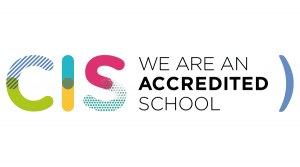Hakkımızda – CIS Akreditasyonu
TED Atakent Koleji hedeflerimizden biri sürekli değerlendirme sürecinde olmaktır. Eğitim ve öğretimizin kalite ve standartlarını çok farklı araçlar ile değerlendirmeye tabi tutarız. Ulusal birçok standartların yanı sıra, uluslararası platformda da standartlarımızı onaylamak adına Uluslararası Okullar Birliğine(CIS) başvuruda bulunarak akreditasyon sürecimiz başlatılmıştır. Uzun bir çalışma sonucu, 2021 Haziran ayında CIS tarafından akreditasyonumuz onaylanmıştır.
“Council of International Schools”- Uluslararası Okullar Birliği (CIS) Nedir?
ECIS (Avrupa Uluslararası Okullar Birliği) 1965 yılında kurulmuş olan, kar amacı gütmeyen ve üyelik bazında faaliyet gösteren, uluslararası okullarla ilgili kurulmuş en büyük birliktir. 1 Temmuz 2003 tarihinden itibaren faaliyetlerini Uluslararası Okullar Birliği (CIS) adı altında sürdürmeye başlamıştır.
Akreditasyon nedir?
Akreditasyon sözcüğünün sözlük anlamı denkliktir. CIS’ın sunduğu akreditasyon hizmeti bağlamında denklik, dünyanın çeşitli yerlerinde bulunan okulların belirli bir kalitede eğitim verdiğinin CIS gibi yetkili ve saygın bir kuruluş tarafından onaylanmasını içerir.
Akreditasyonun amacı nedir?
- Okulun, eğitim öğretimin tüm aşamalarında mükemmellik arayışı içinde olmasını sağlamak,
- Okulun açık bir şekilde belirlenmiş hedefler / standartlar doğrultusunda yüksek kaliteli bir eğitim öğretim programı sunmasını garanti altına almak,
- Tüm okul toplumunun, güçlü ve zayıf yönlerinin farkında olmasını ve sürekli gelişim içinde bunları mükemmelleştirmesini sağlamak,
- Okulun, kendisini dünyadaki benzer okullarla karşılaştırmasına ve global ortamda kendini sınamasına olanak vermektir.
Akreditasyonun kuruma ve kurumun öğrencilerine sağladığı yararlar nelerdir?
- Bir okulun akreditasyon almış olması, yurt içindeki ve yurt dışındaki kişilere, eğitim kurumlarına ve üniversitelere o okulla ilgili son derece olumlu bir mesaj verir,
- Akreditasyon süreci uyarınca titizlikle hazırlanan öz değerlendirme raporu okulun gelişimine çok önemli bir katkı sağlar,
- Akreditasyon süreci okulun çeşitli bölümleri arasındaki uyumu ve iletişimi kuvvetlendirir,
- Okul dışındaki bir merci tarafından yapılan bu nesnel değerlendirme birçok yararlı ve yapıcı öneri doğurur,
- Akreditasyon süreci okulun, dünyadaki diğer okullarla iletişim kurmasına fırsat sağlar,
- Akreditasyon sürecinin bir parçası olan öz değerlendirme çalışması ve yapılan inceleme ziyaretleri sonrasında ECIS’ın okula sunduğu raporlar sonucunda okul ileriye dönük planlar hazırlayabilir,
- Okulun tüm yönleri, yüksek standartlara uyarlanmış olur,
- Okulun tüm yönleriyle ilgili bilgiler bilgisayar ortamında kayıt altında tutulur,
- Okul toplumunun üyeleri eksik ve zayıf noktalarının farkına varır ve bunları düzeltme konusunda sürekli bir çaba içerisine girer,
- Kurumdaki herkes, kendini ve kurumu sorgular ve değerlendirir.
(Kaynak: www.ecis.org)
The process of continuous evaluation is one of the main goals at TED Atakent College.
We evaluate the quality and standards of our education and training with many different learning and teaching tools. In addition to many national standards, our accreditation process started with us applying to the International Schools Association (CIS), in order to have our standards approved on an international platform.
After a thorough and extensive study, our accreditation was approved by CIS in June 2021.
“Council of International Schools” – What is the International Association of Schools (CIS)?
Founded in 1965, the Educational Collaborative for International Schools is a non-profit global membership organisation that supports schools in the areas of teacher development, leadership development, recruitment, and human resources, governance, and risk, complemented by grants and awards.
As of July 1, 2003, the Educational Collaborative for International Schools started to implement these activities under the name of International Schools Association (CIS)
What is accreditation?
According to the Oxford dictionary; accreditation (equivalence) states the condition of being equal or equivalent in value, worth and function. Therefore, in the context of the accreditation service offered by CIS, equivalency involves the certification by an authoritative and reputable organization such as CIS that schools offer a certain quality of education that is accepted worldwide.
What is the purpose of accreditation?
- To ensure that the school seeks excellence at all stages of education,
- To ensure that the school offers a high quality education program in line with clearly defined objectives and standards,
- Ensuring that the entire school community is aware of its strengths and weaknesses, and improve on the weaknesses with the aim to turn them into strengths through continuous development,
- To allow the school to compare and compete with similar schools around the world and to test itself in a global environment.
What are the benefits of accreditation to the institution and its students?
- The fact that a school has received accreditation conveys a positive image about the school to the community, educational institutions and universities locally and abroad,
- The self-evaluation report, which is meticulously prepared in accordance with the accreditation process, makes a salient contribution to the development of the school,
- The accreditation process strengthens the harmony and communication between the various departments within the school,
- This objective assessment by an external authority outside the school, generates many useful and constructive suggestions
- The accreditation process provides an opportunity for the school to communicate with other schools around the world,
- Following the self-assessment study and examination visits, which are part of the accreditation process, the school can prepare future plans. Due to the results of the reports submitted by ECIS to the school.
- All aspects of the school are adapted to higher standards.
- All information about all aspects of the school are recorded in the computer system.
- Members of the school community become aware of their shortcomings and weaknesses and make a continuous effort to improve on these weaknesses.
- Everyone in the institution reflects on their work and evaluates herself as well as the institution.(dişil)
(Source: www.ecis.org)


